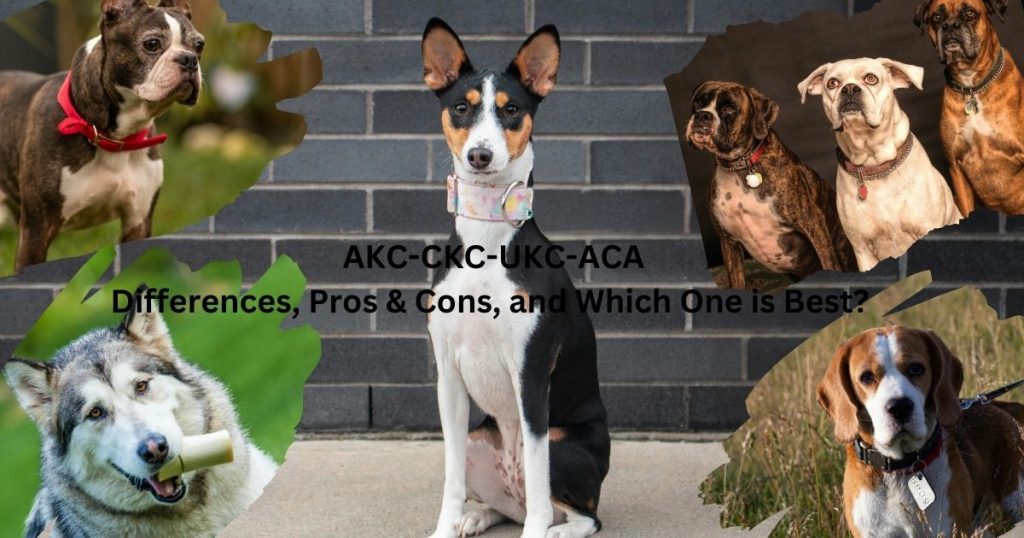In This Article
ToggleIf you’re a dog owner, breeder, or thinking about getting a puppy, you’ve probably come across different kennel clubs like the American Kennel Club (AKC), the Continental Kennel Club (CKC), the United Kennel Club (UKC), & the American Canine Association (ACA). But what do these names really mean? And why do they matter?
Choosing the right kennel club is crucial for breeders and pet owners. These organizations record purebred dogs, set competition rules, maintain breed standards, and provide essential documentation for breeding, shows, and health records.
Kennel clubs register dogs, verify pedigrees, and set breed standards. They help ensure that dogs meet certain health, temperament, and appearance guidelines. Some clubs are stricter, while others are more flexible—this can affect the value of a dog’s registration, eligibility for dog shows, and breeding credibility.
AKC vs. CKC vs. UKC vs. ACA: Varieties & Best One!
Overview of Dog Registries and Their Importance

Dog registries are like official records for dogs. When you register your dog with a kennel club, you’re confirming that your dog belongs to a particular breed and that it meets the breed’s standards. These clubs also help keep track of the dog’s family tree (pedigree) so you know where your dog’s ancestors come from.
Why is this important? Because registration is a sign that your dog comes from a well-documented lineage, and in some cases, it’s required for participating in dog shows, competitions, or breeding programs. Plus, a dog’s registration can affect its value when it comes to selling or buying a purebred dog.
Choosing the right registry is especially crucial for breeders who are working with dogs to maintain the purity of breeds, and for pet owners who simply want to know that their dog is recognized in the wider dog-loving community. The American Kennel Club (AKC), Continental Kennel Club (CKC), United Kennel Club (UKC), and American Canine Association (ACA) are the most common registries in the United States, each with its own set of rules and benefits.
Why Choosing the Right Registry Matters for Breeders and Pet Owners
For breeders, choosing the right kennel club is vital because it impacts their reputation and business. If they are working with high-quality, purebred dogs, they’ll likely want to register with a club like the AKC to ensure they are taken seriously in the breeding world. AKC registration guarantees that a dog comes from a line of dogs that are purebred and meet strict breed standards.
For pet owners, it’s about trust and confidence in knowing that their dog has an official status. When a dog is AKC-registered, it signals to others that their dog is of high pedigree. It also makes it easier to track health and breeding lines, ensuring your dog stays healthy. Additionally, dogs registered with AKC or UKC may have more opportunities for participating in competitive shows or sports.
On the other hand, registries like CKC and ACA are typically more affordable and easier to access but may not offer the same level of prestige or recognition as AKC or UKC. For example, designer breeds like Goldendoodles can easily be registered with CKC, while AKC tends to stick to traditional purebreds only.
This article aims to give you a clear understanding of how these registries stack up against each other, so you can make an informed decision. You’ll find a comparison of their differences, the pros and cons of each, and insights into which registry is best for your dog and breeding goals.
Understanding Dog Registries
What is a Dog Registry?
A dog registry is an official record that tracks the lineage of a dog and confirms its breed status. When you register your dog with a kennel club, you are providing proof that your dog comes from a line of dogs that share specific characteristics and meet the breed’s standards. Think of it as an ID card for dogs – it shows who they are, where they come from, and their family history (called pedigree).
These records are crucial because they help maintain the purity of the breed, support responsible breeding, and allow dogs to participate in dog shows, competitions, and other events. The registry ensures that dogs meet certain physical and behavioral characteristics that define their breed, making sure we don’t lose the special traits of each dog breed over time.
The Role of Registries in Pedigree Verification, Breeding, and Show Eligibility
When you breed dogs, it’s essential to ensure that the parents are both purebred and have a solid lineage. Pedigree verification means checking a dog’s family history to confirm it is part of a specific breed. This helps breeders avoid mixing breeds accidentally and ensures the health and qualities of the dog breed are preserved.
Dog shows are another area where dog registries are important. Dogs must be registered with a recognized kennel club, like the AKC or UKC, to participate in these shows. Without proper registration, a dog might not be allowed to compete, and its pedigree might not be considered valid.
Why AKC Registration vs. CKC Registration is a Big Debate
The AKC (American Kennel Club) and CKC (Continental Kennel Club) are two of the most popular registries in the United States, but they are very different in terms of standards, rules, and costs. The AKC is often seen as the most prestigious registry, especially for purebred dogs that will be shown in competitions. On the other hand, CKC is seen as more affordable and flexible, allowing a broader range of breeds, including some designer mixes like Goldendoodles.
Some dog owners and breeders debate which registry is the best and whether the AKC’s strict rules are worth the higher costs compared to the more inclusive approach of CKC. This is especially important when it comes to choosing whether to register with AKC, CKC, or another club, as each has its unique set of rules, costs, and benefits.
Overview of Major Dog Registries

American Kennel Club (AKC)
The AKC is one of the oldest and most respected dog registries in the world. It’s known for setting high standards for dog breeds and organizing various dog shows, including the famous Westminster Kennel Club Dog Show. AKC registration is seen as a symbol of quality and is often required for high-level breeding programs and competitive dog sports.
AKC’s Registration Requirements and Process
To register your dog with AKC, the dog must be a purebred and meet certain physical characteristics that define its breed. The AKC’s process involves submitting the dog’s pedigree (family tree) and paying a registration fee. Dogs must also be examined by a vet to ensure they meet the health requirements of the breed. If your dog is purebred but doesn’t have a registered lineage, it can still be registered through a process called AKC Canine Partners, which includes dogs of unknown parentage or mixed breeds.
Benefits of AKC Registration (Shows, Credibility, Breed Purity)
- Credibility: AKC registration adds credibility to a breeder’s reputation. It shows that their dogs meet the highest standards and have verified pedigrees.
- Participation in Shows: Dogs with AKC registration can participate in the AKC dog shows, where they can compete for titles and awards.
- Breed Purity: AKC ensures that each registered dog is purebred, maintaining the integrity of the breed.
Can Mixed Breeds Register with AKC?
While the AKC primarily focuses on purebred dogs, mixed breeds can also register with the AKC Canine Partners program. This allows non-purebred dogs to participate in agility events, obedience competitions, and other sports, even though they are not eligible for conformation dog shows.
Continental Kennel Club (CKC)
What Does the CKC Do?
The CKC is another popular dog registry, though it is often seen as less strict than AKC. It provides a more affordable option for dog owners and breeders, and it accepts a wider range of dog breeds, including designer breeds (e.g., Goldendoodles, Labradoodles). CKC is known for its flexible registration process and ability to accommodate mixed breed dogs.
CKC’s Registration Requirements and Process
CKC registration is simpler and typically involves providing a dog’s pedigree (if known), and paying a fee. The process is more inclusive, allowing for non-purebred and mixed breed dogs to be registered. This makes it a good option for pet owners who have designer breeds or dogs that don’t fit into the AKC’s strict rules.
Benefits of CKC Registration (More Flexibility, Mixed Breeds Allowed)
- Flexibility: CKC allows for a variety of breeds, including those that may not meet AKC’s strict breed standards.
- Affordable: Registration with CKC is generally cheaper than AKC, making it an attractive option for budget-conscious dog owners.
- Mixed Breeds: Unlike AKC, CKC allows mixed breed dogs to register, which opens up options for a wider variety of pets to be officially recognized.
Can CKC Dogs Be Registered in AKC?
Yes, in some cases. If your dog is registered with CKC, it may be eligible for AKC registration if it meets certain breed standards. However, AKC may not recognize all CKC registrations, particularly for designer or mixed breeds.
United Kennel Club (UKC)
What Does the UKC Do?
The UKC is another major dog registry that is known for its focus on performance and sports. It places a heavy emphasis on how dogs perform in hunting, agility, and obedience trials. UKC dogs can participate in dog shows and events that require performance as well as breed standard conformance.
UKC’s Registration Requirements and Process
UKC registration involves providing proof of a dog’s pedigree and verifying that the dog meets the breed’s standard. UKC’s registration process is similar to AKC’s in that it requires purebred dogs, but it also emphasizes performance over strict breed standards, making it attractive for owners of working dogs or those who participate in dog sports.
Benefits of UKC Registration and How It Differs from AKC
- Performance-Focused: UKC is ideal for owners of dogs that compete in performance sports.
- Affordable Registration: UKC registration fees are often cheaper than AKC’s.
- More Inclusive: Like CKC, UKC allows for a greater variety of breeds, including those that may not be recognized by AKC.
Can Mixed Breeds Register with UKC?
Yes, UKC allows mixed breed dogs to register and participate in events, including performance-based competitions. However, mixed breeds may not be eligible for certain conformation shows where only purebred dogs are allowed.
American Canine Association (ACA)
What Does the ACA Do?
The ACA is another dog registry that provides a more affordable alternative to AKC, especially for breeders who may want to register non-purebred or mixed breed dogs. ACA focuses on maintaining breed integrity while also offering options for a wide range of dog breeds.
Differences Between AKC and ACA
The ACA is generally less strict than AKC and allows more flexibility for dog owners and breeders. While AKC is focused on purebred dogs and maintaining breed standards through rigorous rules and requirements, ACA is often seen as less formal and more inclusive of non-purebred dogs.
Why Should I Register My Dog with ACA?
ACA can be a great choice for owners of designer breeds or non-purebred dogs who want a more affordable and accessible registration option. It’s also a good alternative for breeders who want a simpler and quicker registration process.
AKC vs. CKC: The Key Differences
Registration Process & Requirements
One of the biggest differences between the AKC (American Kennel Club) and the CKC (Continental Kennel Club) is the registration process. The AKC has a strict process to ensure only purebred dogs are registered. For a dog to be registered with the AKC, it needs to have a pedigree, meaning its family history must be documented to prove it’s purebred. This process can take time and often involves paperwork and proof of the dog’s lineage.
On the other hand, CKC has a more relaxed registration process. While CKC still requires dogs to be purebred for certain breeds, they also allow designer breeds and some mixed breeds to be registered. For example, Goldendoodles and other mixed breeds that might not meet the AKC’s strict standards can still be registered with CKC.
Does CKC Registration Mean Anything?
Many dog owners wonder if CKC registration holds the same weight as AKC registration. While CKC is a legitimate registry, it doesn’t have the same prestige or recognition in the dog show world as the AKC. For example, dogs that are AKC registered are often preferred in dog shows and competitive events because the AKC’s standards are more widely recognized.
However, for some dog owners, CKC registration might be more affordable and accessible, especially for those who own designer dogs or dogs that don’t meet the AKC’s strict guidelines.
Why AKC Registered Dogs Are Often Preferred for Shows
AKC registration is highly respected in the world of dog shows. This is because the AKC’s breed standards are seen as the gold standard for dog breeds. Dogs with AKC registration can compete in prestigious events like the Westminster Kennel Club Dog Show. AKC-registered dogs are often preferred by judges in these shows because they’ve met the rigorous breed standards set by the AKC.
Reputation & Legitimacy
Is CKC a Good Registry?
CKC is considered a valid registry, but it’s not seen as having the same prestige as the AKC. While CKC registration is perfectly legitimate for many dog owners, especially those with mixed breeds or designer breeds, it doesn’t carry the same weight in the competitive dog world. For some people, CKC is a great option, but for those focused on purebred competitions or breed-specific events, the AKC might be a better choice.
Why is AKC Better than CKC?
The AKC is often preferred because it has more stringent rules and offers a higher level of credibility. It’s the largest and most respected dog registry in the world. Because the AKC has stricter guidelines, it ensures that registered dogs meet the breed’s purity standards and have documented pedigrees. This makes AKC dogs more sought after for breeding and shows.
Are CKC Papers Worthless?
No, CKC papers are not worthless. While they may not be as prestigious as AKC papers, they still serve a purpose. CKC registration can be important for non-purebred dogs and mixed breeds, as well as for breeders of designer dogs. CKC papers can provide proof that the dog has been registered and may allow the dog to participate in certain events. However, for those looking to participate in AKC shows or get their dog recognized by the AKC, CKC registration won’t be sufficient.
Breed Standards & Pedigree Verification

Does AKC Registration Mean Purebred?
Yes, when a dog is AKC registered, it generally means that the dog is purebred. The AKC registration process requires that dogs have a verified pedigree, proving their lineage and confirming that they meet the breed’s specific standards. This makes AKC registration a trusted symbol of breed purity in the dog world.
Can CKC Dogs Be Registered in AKC?
In some cases, CKC-registered dogs can be registered with AKC if they meet the breed standards of the AKC. However, AKC may not accept all CKC registrations, especially for designer breeds or mixed breeds. If the dog meets the AKC’s breed standards and has a documented pedigree, it may be eligible for AKC registration.
Are CKC Dogs Purebred?
Many CKC-registered dogs are indeed purebred. However, CKC also allows for designer breeds and mixed breeds to be registered, which is not the case with the AKC. So, while many CKC dogs are purebred, the registry is more flexible and allows for a wider variety of breeds, including non-purebred dogs.
Price Comparison: AKC vs. CKC vs. Other Registries

AKC vs. CKC Price – How Much Does it Cost?
The cost of registration with the AKC is generally higher than with the CKC. For example, registering a dog with AKC usually costs between $30 to $100 depending on the breed and whether it’s a single dog or a litter. For CKC, the cost of registering a dog is typically cheaper, often ranging from $20 to $40 for most dogs.
The AKC charges higher fees because they require more paperwork and have stricter rules for registration. On the other hand, the CKC provides a more affordable option and is often chosen by people with non-purebred dogs or those who want to register designer breeds.
Continental Kennel Club vs. AKC Cost Breakdown
- AKC Registration Fees: Generally more expensive, with costs ranging between $30 and $100.
- CKC Registration Fees: More affordable, with costs typically between $20 and $40.
For breeders, the difference in cost can add up, but it’s important to keep in mind that the AKC’s higher costs are often justified by the prestige and credibility that come with registration.
Is AKC Worth It for the Price?
For those who plan to breed dogs for shows or want a dog that is recognized by the highest standards in the dog world, AKC registration is absolutely worth the price. It adds credibility, increases a dog’s value, and opens the door for participation in dog shows and competitions. For others, especially those with designer breeds, CKC registration might be a better option because it’s more affordable and still provides a valid registration.
Breeding & Show Eligibility
What is the Best Registration for a Dog?
The best registration depends on what you plan to do with your dog. If you want your dog to compete in shows and participate in high-level breeding programs, AKC is the best choice. If you have a designer breed or want to register a mixed breed, CKC or ACA might be better options.
Can CKC Dogs Participate in Shows?
CKC-registered dogs can participate in some dog shows, but not those that are specifically organized by the AKC. Since CKC is a less recognized registry in the competitive dog world, its dogs might not be eligible for AKC-sanctioned shows. However, CKC dogs can compete in events that are open to dogs of various breeds and can earn titles in other competitions.
Do AKC Papers Mean Anything?
Yes, AKC papers are highly valued in the world of dog breeding and dog shows. They verify that a dog is purebred and meets the breed standards. AKC registration helps establish credibility for breeders, and it’s a requirement for many competitive dog events. Therefore, AKC papers are important for anyone serious about breeding or participating in high-level shows.
CKC vs. AKC vs. UKC: Key Differences
Which Registry Recognizes More Breeds?
- AKC recognizes over 190 breeds.
- CKC recognizes a broader range of breeds, including designer breeds.
- UKC recognizes many of the same breeds as AKC but also places more focus on working dogs and performance breeds.
How Many Breeds are Recognized by CKC?
CKC recognizes a wide variety of breeds, but it doesn’t always follow the same strict standards as the AKC. It’s a more inclusive registry that often registers designer and mixed breeds.
How Many Breeds are Recognized by AKC?
AKC recognizes 190+ purebred breeds, and it has rigorous standards for each one to ensure breed integrity and quality.
Show Eligibility & Performance Events
- AKC is the leading registry for dog shows.
- CKC allows for designer breeds but doesn’t have the same prestigious reputation for show eligibility.
- UKC offers registration for a wide range of breeds, focusing heavily on working and performance dogs, and its shows include a broader variety of events, including obedience and agility competitions. If you’re more into performance sports or events like field trials, the UKC might be a great choice, while the AKC is preferred for traditional dog shows.
Does CKC Allow Inbreeding?
While CKC registration allows a broader range of dogs to be registered, it is still important for breeders to follow ethical breeding practices. CKC does not specifically condone inbreeding, but the organization’s registration process may not be as strict as the AKC’s when it comes to lineage verification. Therefore, it’s up to the breeders to ensure they are not breeding dogs with genetic issues or inbreeding.
What Does BISS Mean in Dog Shows?
BISS stands for Best in Specialty Show. It is a prestigious award given at dog shows, recognizing the best dog in a specific breed or group. Dogs that win this title are considered top-tier in their breed. This title is most commonly seen in AKC-sanctioned events, where breed standards are strictly followed.
What Does UTD Mean for Dogs?
UTD stands for Up to Date, and it refers to a dog’s vaccinations being current. A dog that is UTD has received the appropriate vaccines and preventative treatments (like flea and tick preventions) required for its age and health status. It’s crucial for the health and safety of both the dog and others it comes into contact with, particularly in environments like dog shows or boarding kennels.
AKC vs. CKC vs. ACA: Which One is More Legitimate?

Why Are Goldendoodles Not Recognized by AKC?
The Goldendoodle, a mix between the Golden Retriever and Poodle, is a designer breed and is not recognized by the AKC as a purebred breed. The AKC only registers purebred dogs that meet specific breed standards. However, Goldendoodles can still be registered with other organizations like the CKC or the ACA, which recognize designer and mixed breeds.
Can a Goldendoodle Be CKC Registered?
Yes, a Goldendoodle can be registered with the CKC. Since CKC is more flexible about registering designer breeds and mixed breeds, it allows Goldendoodles and similar mixes to be recognized. If you have a Goldendoodle, registering with CKC can provide you with official papers that verify your dog’s lineage and status.
How Much is a CKC Goldendoodle?
The cost of a CKC Goldendoodle can vary depending on the breeder, location, and the dog’s lineage. Typically, prices for Goldendoodles range from $1,000 to $3,000, but for dogs registered with CKC, the cost may be slightly lower compared to AKC Goldendoodles. Remember that CKC registration doesn’t guarantee the same level of breed integrity as AKC registration, but it provides official recognition for the breed.
Common Questions About Dog Registries
When you’re dealing with dog registries, it’s normal to have many questions. Understanding the ins and outs of paperwork, registration, and the ethical considerations can make a huge difference in choosing the right kennel club for your dog.
Paperwork & Registration Concerns
CKC Papers Are Worthless – Myth or Fact?
The idea that CKC papers are worthless is just a myth. While the AKC might be seen as a more prestigious registry due to its strict breed standards and wider recognition, CKC registration still holds value. It provides an official document that attests to the pedigree of your dog within the Continental Kennel Club system. For dog owners or breeders who prioritize a less rigid process for registration, CKC offers a valid and legitimate alternative. While it may not carry the same weight in dog shows, it’s still a credible form of registry.
Do Both Parents Have to Be CKC Registered?
Yes, for a dog to be eligible for CKC registration, both parents must usually be registered with the CKC. This ensures that your dog has come from a documented lineage within the CKC system. However, if your dog is a mixed breed or doesn’t have papers, you can still register it with CKC but under different guidelines. For purebred dogs, both parents need to have CKC registration in place before their offspring can be added.
How Do I Register My Dog if I Don’t Have Papers?
Registering a dog without papers can be a bit more complicated but it’s still possible. Some registries, including both the AKC and CKC, offer a late registration process. For the AKC, this usually requires providing evidence of the dog’s parentage, such as DNA testing or a breeder’s affidavit. The CKC is generally more flexible, and they may accept your dog based on a variety of documented or informal proofs, such as photographs, breeder statements, or DNA tests. If your dog is a mixed breed or lacks documentation, the process can vary depending on the registry.
How to Prove a Dog is Purebred Without Papers?
It’s challenging to prove a dog is purebred without papers, but not impossible. For registries like the AKC, a DNA test can help verify the breed of your dog. The test typically analyzes your dog’s genetic makeup and compares it to the breed standards of recognized breeds. While this process can confirm the dog’s breed, it might not automatically qualify the dog for full registration with certain clubs if the dog doesn’t meet the breed’s specific standards. For dog owners looking to show or breed, registration is important, but DNA testing can still help clarify the dog’s breed even without papers.
Can You Get an Unpapered Dog Papered?
Yes, it’s possible to get an unpapered dog papered through a process called late registration or by providing evidence of the dog’s parentage and heritage. This usually involves submitting DNA results, a pedigree report, or the breeder’s documentation. If your dog’s parents are registered with a recognized registry like the AKC or CKC, it may be easier to register your dog officially. However, not all registries accept late registration, so it’s important to verify with the specific kennel club.
How Many Generations Until a Dog is Purebred?
For a dog to be considered truly purebred, it typically needs to come from at least three generations of dogs within the same breed. This ensures that the traits, characteristics, and behaviors of the breed are consistent and passed down through generations. For most kennel clubs, three generations is the minimum requirement to classify a dog as purebred. Dogs that come from mixed or unknown lineage might not qualify as purebred and may not meet the breed standards for shows or breeding.
Breeding & Ethical Considerations

What Takes Place When a Sister and Brother Dog Mate?
When a brother and sister dog mate, it’s considered inbreeding. Inbreeding can lead to genetic defects, including heart issues, joint problems, and behavioral challenges. Dogs that are bred from closely related parents are more likely to pass down recessive traits, which may include undesirable physical or mental characteristics. Ethical breeders avoid inbreeding and aim for a genetically diverse breeding pool to maintain the health and well-being of the dogs they produce.
If a puppy comes from a puppy mill, how can you tell?
Puppies from a puppy mill often display signs of neglect or poor care, which can include:
- Health issues: puppies from puppy mills may have chronic health problems such as weak immune systems or respiratory issues.
- Behavioral problems: A lack of socialization in a puppy mill environment can lead to fearful, aggressive, or shy behavior.
- Unsanitary living conditions: Dogs from puppy mills are often kept in cramped, dirty conditions without adequate veterinary care or attention. If you suspect a puppy is from a puppy mill, be sure to ask for the puppy’s medical records, breeding history, and see where the puppies were raised. Ethical breeders will provide this information and ensure the puppies are raised in healthy, safe environments.
Is It Bad to Buy a Dog from a Puppy Mill?
Yes, buying a dog from a puppy mill is unethical. Puppy mills prioritize profit over the well-being of animals, leading to poor living conditions, genetic problems, and emotional trauma for the dogs. Supporting puppy mills encourages their continued existence and the exploitation of animals. If you’re looking to purchase a dog, always choose a responsible breeder who follows ethical breeding practices and cares for the dogs they raise.
Should You Buy a Dog Without AKC Papers?
Whether or not you should buy a dog without AKC papers depends on your goals. If you are simply looking for a family pet and don’t plan to show the dog or breed it, AKC papers may not be necessary. However, if you want a dog for breeding or competition purposes, AKC registration is often considered the most reliable and prestigious form of registration, ensuring that the dog meets strict breed standards.
Kennel Club-Specific Questions
Does CKC Registration Mean Anything?
CKC registration does mean something. It provides formal recognition of a dog’s lineage, especially for mixed breeds or designer breeds that might not meet the AKC’s stricter standards. While CKC registration is seen as less prestigious compared to AKC, it still provides an official record that your dog is recognized within the Continental Kennel Club system. If you’re not interested in showing your dog or focusing on strict breed standards, CKC registration can be a perfectly valid option.
Is CKC a Puppy Mill?
The Continental Kennel Club (CKC) is not a puppy mill. It is a legitimate dog registry that offers official recognition for a variety of breeds, including purebreds, mixed breeds, and designer dogs. However, as with any registry, it’s crucial to make sure the breeder you’re working with is responsible and avoids practices like puppy mills. Do thorough research into the breeder’s ethics and ensure they follow the necessary regulations to protect the health and welfare of the animals.
Can CKC Become AKC?
No, the CKC cannot become the AKC because they are two separate organizations with different guidelines and registration standards. The AKC is more exclusive and focuses strictly on purebred dogs, while the CKC is more flexible, allowing for mixed breeds and designer breeds. However, a dog registered with CKC cannot automatically be converted into AKC registration, but it may be eligible for transfer or registration under AKC if it meets the breed standards set by the club.
Are Pitbulls Recognized by CKC?
Yes, Pitbulls are recognized by the Continental Kennel Club. In contrast to the AKC, which has specific requirements for breed recognition, the CKC allows for a wider variety of breeds, including Pitbulls. If you have a Pitbull and want to register it with the CKC, this is possible as long as the dog meets the breed’s standards.
Does It Matter if a Dog Is CKC Registered?
Whether or not a dog is CKC registered depends on your personal goals. If you’re seeking a dog for pet purposes and don’t have aspirations to compete in shows or breed, then CKC registration can be a solid option. However, if you are interested in showing your dog or focusing on purebred breeding, AKC registration may be more important due to its strict breed standards and greater recognition.
Which Service Dog Registry Is Legitimate?
In the U.S., there is no official service dog registry required by law. The most important factor is the training the dog has received. Dogs that assist with disabilities must be trained to perform specific tasks that help their handler. If a dog is trained, it can be considered a legitimate service dog, regardless of registration. However, for identification purposes, you can register the dog with any voluntary registry to provide credentials, though it’s the training that truly defines the dog’s role.
Which Registry is Right for You?
Choosing the right dog registry can be a big decision for dog owners and breeders alike. There are several key factors to consider, such as your dog’s breed, your breeding goals, whether or not you want to show your dog, and how important registration credibility is to you. Each of the major kennel clubs—AKC, CKC, UKC, and ACA—offers different benefits, and knowing which one aligns with your needs can make a huge difference. Let’s break down who each registry is best suited for.
Who Should Choose AKC?
The American Kennel Club (AKC) is the gold standard for those interested in purebred dogs. If you are a breeder who wants to maintain strict breed standards and keep the purity of the breed line, AKC registration is essential. The AKC offers worldwide recognition and is highly respected in the dog world. This registry is also best for individuals who are serious about participating in dog shows, breeding for conformation, and maintaining breed integrity.
If you want to be involved in high-level dog competitions like Westminster Kennel Club Dog Show, AKC is where you’ll want to register your dog. This registry ensures that the dog has met the breed’s strict standards and has a proven lineage, which is why many competitive breeders and show dogs prefer AKC.
Furthermore, AKC offers a wide range of events, from conformation dog shows to obedience trials and agility courses, making it the best option for dog owners who want to participate in organized dog sports. It also provides a strong marketability factor if you plan to sell or breed your dogs.
- If you’re planning to breed dogs with a focus on maintaining breed purity and lineage.
- If you want to enter your dog in competitive shows and events.
- If you’re a breeder interested in high-quality bloodlines that are recognized worldwide.
Who Should Choose CKC?
The Continental Kennel Club (CKC) offers a more flexible approach compared to AKC. CKC registration is an excellent option for pet owners and breeders who don’t necessarily want to follow strict breed standards but still want their dog registered officially. One of the major differences with CKC is that they allow the registration of mixed-breed dogs and designer breeds, which AKC does not. This makes it a great option for those with crossbreeds or less traditional dogs.
While AKC registration might be necessary for competitive show dogs, CKC registration offers more affordable and accessible options for owners who just want to keep an official record of their dogs without the added pressure of strict breed rules. CKC registration may also be a good choice if you’re just starting out as a breeder or looking to join a community that’s not as focused on competitive shows but still values proper dog records.
- If you have a mixed-breed dog or designer dog and want official documentation.
- If you’re breeding dogs but don’t need to follow strict breed standards for shows.
- If you want a budget-friendly registration option that is easier to access.
When UKC or ACA Might Be a Better Choice
The United Kennel Club (UKC) and the American Canine Association (ACA) may offer better options in certain situations. Each has specific advantages that may suit your needs better than AKC or CKC, depending on what you want from a dog registry.
United Kennel Club (UKC)
The UKC offers a balance between AKC’s strict standards and CKC’s more flexible approach. The UKC is ideal for dog owners and breeders who want to show their dogs but also want a registry that is less rigid than the AKC. UKC allows for more variety in breeds, including rare or less common types that might not meet AKC’s strict standards.
Additionally, UKC has its own set of competitive events, which can be a great choice if you’re not focused on the AKC’s breed-specific shows but still want to participate in a dog sports community. UKC is known for welcoming a wider variety of breeds and fostering a friendly, inclusive environment for both pet owners and breeders.
American Canine Association (ACA)
The ACA provides an affordable and practical option for pet owners who don’t need their dog to meet strict breed standards but still want a formal registration. The ACA’s low-cost registration is good for people who want to keep their dogs on record without the pressure of showing or breeding for purebred dogs. It’s also an attractive option for those who want an easy, no-fuss registration process.
ACA registrations are less widely recognized than AKC or CKC, but it’s still a reputable choice for pet owners who just want to document their dog’s lineage or add some level of credibility without aiming for competitive breeding or showing. ACA is also popular among dog breeders who don’t need the heavy restrictions placed by other registries.
- If you want to show your dog but don’t need the same breed-specific restrictions that AKC places on show dogs.
- If you are looking for an inclusive, diverse registry that recognizes a wide variety of breeds.
- If you want a cost-effective option without needing to worry about participating in high-level dog shows.
Final Thoughts
Ultimately, the best dog registry for you will depend on what you want to accomplish with your dog, whether you’re looking for prestige, affordability, or flexibility. If your goal is to breed purebred dogs and compete in high-level dog shows, then AKC is your best choice. It offers the most prestige and recognition in the dog world. If you’re not concerned with maintaining strict breed standards and you have a mixed breed or a designer breed, CKC may be a better fit for you. It provides affordable registration with fewer restrictions.
However, if you’re interested in a middle ground, UKC offers a great balance of breed recognition and variety, while ACA provides an easy and cost-effective solution for general pet owners and hobby breeders. Before making your choice, consider your dog’s needs, your goals as an owner or breeder, and how much you value a formal registry. Each kennel club has its pros and cons, but with a little research, you can choose the one that’s best suited to your needs and your dog’s future.







